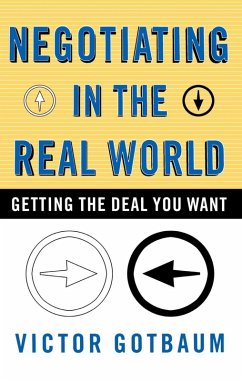"Negotiating is a face-to-face human drama that can be as genteel as croquet or as brutal as a prizefight," observes Victor Gotbaum. He should know -- no one has mastered this drama better than Gotbaum himself, who for more than twenty years headed the largest municipal employees' union in the country, earning a reputation as a tough, skilled negotiator who gets results. In Negotiating in the Real World, he draws on his experience to show how readers can also get results by sharpening their negotiating skills in every situation -- from getting a raise to buying a house or getting a divorce.
All of us negotiate every day, sometimes in ways we don't even think of as negotiating. Resolving a problem with a coworker, discussing your child's allowance, or reaching agreement with your spouse on how much television your children should be watching are all examples of negotiations. And all negotiations, large and small, business or personal, follow the same principles. In clear and candid terms, Victor Gotbaum explains what those principles are: evaluating your own negotiating ability; measuring the ability and interests of your adversary; understanding the interests of those you represent; and being aware of how outside factors influence your negotiations.
In Negotiating in the Real World, Gotbaum cites examples of how awareness or ignorance of these principles determined the outcome of a negotiation. Drawing on decades of expertise, he discusses how to keep the momentum going in negotiations, how to recognize when emotion becomes a stumbling block, and when to bring in a third party (using the 1994 Major League Baseball strike as one example). He explains the different types of mediators and arbitrators, and why you should avoid some of them except as an absolute last resort.
Illustrated with numerous anecdotes and examples from real-life situations, and written with the frank, hard-hitting style for which Gotbaum is renowned, Negotiating in the Real World is an invaluable and practical guide for both novice and experienced negotiators on how to walk away from the bargaining table a winner.
All of us negotiate every day, sometimes in ways we don't even think of as negotiating. Resolving a problem with a coworker, discussing your child's allowance, or reaching agreement with your spouse on how much television your children should be watching are all examples of negotiations. And all negotiations, large and small, business or personal, follow the same principles. In clear and candid terms, Victor Gotbaum explains what those principles are: evaluating your own negotiating ability; measuring the ability and interests of your adversary; understanding the interests of those you represent; and being aware of how outside factors influence your negotiations.
In Negotiating in the Real World, Gotbaum cites examples of how awareness or ignorance of these principles determined the outcome of a negotiation. Drawing on decades of expertise, he discusses how to keep the momentum going in negotiations, how to recognize when emotion becomes a stumbling block, and when to bring in a third party (using the 1994 Major League Baseball strike as one example). He explains the different types of mediators and arbitrators, and why you should avoid some of them except as an absolute last resort.
Illustrated with numerous anecdotes and examples from real-life situations, and written with the frank, hard-hitting style for which Gotbaum is renowned, Negotiating in the Real World is an invaluable and practical guide for both novice and experienced negotiators on how to walk away from the bargaining table a winner.
Dieser Download kann aus rechtlichen Gründen nur mit Rechnungsadresse in A, B, BG, CZ, D, DK, EW, E, FIN, F, GR, HR, H, I, LT, L, LR, NL, PL, P, R, S, SLO, SK ausgeliefert werden.









